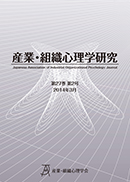All issues

Volume 27 (2013 - 201・・・
- Issue 2 Pages 77-
- Issue 1 Pages 3-
Volume 27, Issue 2
Displaying 1-5 of 5 articles from this issue
- |<
- <
- 1
- >
- >|
-
Shingo ABE, Tomotsugu KAWASAKI2014Volume 27Issue 2 Pages 77-86
Published: 2014
Released on J-STAGE: August 05, 2019
JOURNAL FREE ACCESSThis study examined the influences of the distribution of worthwhileness and time in livelihood domains on happiness. In addition, it was also examined the differences of the determinants of happiness in each distribution pattern. Participants (1558 fulltime workers) completed the questionnaire. Results showed that when the most worthwhile domain and the domain taken time most were the same, especially when it was family domain, life satisfaction and happiness level tended to be high. Furthermore, it was suggested that in each pattern, happiness level is related to harmonization among domains.View full abstractDownload PDF (1203K) -
Tomoko ADACHI2014Volume 27Issue 2 Pages 87-100
Published: 2014
Released on J-STAGE: August 05, 2019
JOURNAL FREE ACCESSThe problem of occupational gender segregation in Japan has not yet been resolved. Both men and women are apt to choose occupations traditionally dominated by members of their own gender and avoid those dominated by members of the opposite gender. The purpose of this study was to examine occupational gender stereotypes and their relationships with self-efficacy and gender role attitudes. In Study 1, occupational gender stereotypes and self-efficacy were assessed using the Masculinity- Femininity (Mf) scale of the Vocational Preference Inventory (VPI), which includes 7 male-dominated occupations and 7 female-dominated occupations. Valid responses were obtained from 383 university students (218 females and 165 males). The results showed that university students recognized traditionally male-dominated occupations as masculine and female-dominated occupations as feminine, regardless of their own gender. In Study 2, analyses of data from 565 women’s university students demonstrated that occupational gender stereotypes were salient in female students with traditional gender role attitudes, and that gender role attitudes moderated the relations between gender stereotypes and selfefficacy for a few occupations which were recognized as gender neutral. These findings have implications for career interventions focusing on gender stereotypes to support contemporary university students.View full abstractDownload PDF (1323K) -
Miyuki KIKUIRI, Masaki OKADA2014Volume 27Issue 2 Pages 101-116
Published: 2014
Released on J-STAGE: August 05, 2019
JOURNAL FREE ACCESSThe purpose of this research was to examine exploratively the process of social contagion and other factors affecting achievement motivation of young adult workers in the workplace, focusing on "selffulfillment achievement motive" and "competitive achievement motive". An interview investigation was undertaken with 8 adults working for companies, and also a multi-stage path model was proposed, analyzing the questionnaire responses of 355 people. Major findings were as follows: (1) "inference of self-fulfillment achievement motive of a colleague" had a direct impact on "change in self-fulfillment achievement motive", and "inference of competitive achievement motive of a colleague" had a direct impact on "change in competitive achievement motive"; (2) Through a "recognition of reference power of a colleague"and "reaction to achievement motive of a colleague", "inference of achievement motive of a colleague" had an indirect impact on "change in achievement motive"; (3) "inference of self-fulfillment achievement motive of a colleague" had a positive impact indirectly on "change in two aspects of motive", and "inference of competitive achievement motive of a colleague" had a negative impact indirectly on "change in two aspects of motive".View full abstractDownload PDF (1293K) -
Takehiko ITO, Kaori KARASAWA2014Volume 27Issue 2 Pages 117-127
Published: 2014
Released on J-STAGE: August 05, 2019
JOURNAL FREE ACCESSThis study examines the effect of intergroup inequity on supportive attitudes toward government policies to reduce this inequity, as well as causal inferences of individual negative results toward companies in job hunting, focusing on the inequity that results from achieved status. We presented vignettes depicting a job-hunting situation to undergraduates, followed by an interuniversity inequity scenario. The results showed that for high in-group identifiers, intergroup inequity enhanced supportive attitudes toward government policies that address inequity; however, for low in-group identifiers, intergroup inequity did not influence these attitudes. The results also showed that for high in-group identifiers, intergroup inequity enhanced causal inferences of individual negative results toward companies, but for low in-group identifiers, intergroup inequity did not influence the inferences. We discuss the psychological responses to intergroup inequity from the perspective of achieved status, which has not been addressed in previous intergroup inequity studies. In addition, we constructed a new model and expect that future studies will confirm the importance of intergroup inequity and achieved status on attitudes and causal inferences.View full abstractDownload PDF (1265K) -
2014Volume 27Issue 2 Pages 129-137
Published: 2014
Released on J-STAGE: October 08, 2020
JOURNAL FREE ACCESSDownload PDF (1228K)
- |<
- <
- 1
- >
- >|